Power Comes from Righteous Patterns, Bishop Davies Tells Graduates
Contributed By Marianne Holman Prescott, Church News staff writer
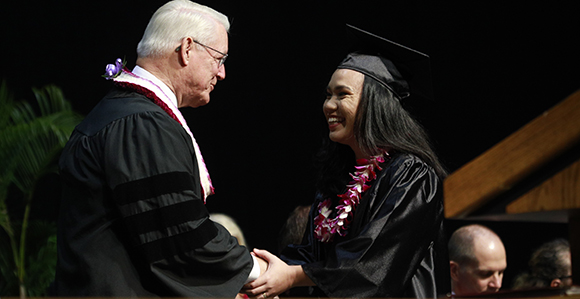
Bishop Dean M. Davies of the Presiding Bishopric shakes hands with a graduate after BYU–Hawaii graduation on June 30. Photo by Monique Saenz, BYU–Hawaii.
Article Highlights
- Following the Lord’s decreed patterns will protect us from the deceit and temptations of the adversary and cause our lives to be full and fruitful.
“If you establish righteous patterns at this early age and continue them throughout your lives, the Lord will use you to accomplish His purposes.” —Bishop Dean M. Davies of the Presiding Bishopric
In both his professional and ecclesiastical life, Bishop Dean M. Davies of the Presiding Bishopric has been involved in procuring the sites and overseeing the design and construction of temples around the world.
Bishop Davies explained that while on assignments visiting the various cities, it is a process to find the right locations for temples. Rarely has he been handed GPS coordinates of the identified property to purchase. Rather, he has to analyze various options and then seek out spiritual discernment to know which property is what the Lord would have him recommend.
“I have learned that the only way I can carry out such a sacred and humbling responsibility is to follow patterns of personal behavior which enable me to receive and comprehend the subtle whisperings of the Holy Spirit,” Bishop Davies told BYU–Hawaii graduates during commencement on June 30.
In his remarks, Bishop Davies encouraged listeners to establish righteous patterns. “Just as with temples, we make our lives holy and worthy of the Lord’s acceptance by conforming to His decreed patterns—patterns which, if carefully followed, will protect us from the deceit and temptations of the adversary and cause our lives to be full and fruitful,” he said.
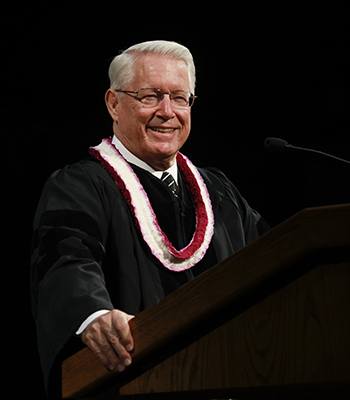
Bishop Dean M. Davies of the Presiding Bishopric speaks during BYU–Hawaii graduation on June 30. Photo by Monique Saenz, BYU–Hawaii.
There is power, purpose, and peace in following divine patterns, he taught.
“If you establish righteous patterns at this early age and continue them throughout your lives, the Lord will use you to accomplish His purposes,” he said.
Bishop Davies shared three essential patterns that have helped him in his own life.
1. Prayer and fasting.
“How could you ever think of going out into this new life that awaits you without daily asking the Lord that He will direct you to the people you need to meet and opportunities you need to have in order to accomplish the mission that He has in mind for you?” he asked. “How could you let a single fast Sunday go by without fully participating in the fast and supplicating the Lord to pour down His blessings upon you and your loved ones? My dear young friends, please don’t ever become so complacent or preoccupied that you lose the habit of consistent prayer and fasting.”
2. Seek out and meticulously follow the words of the Lord and His servants.
“The combination of the words recorded in the holy scriptures and those spoken by modern Church leaders, if diligently studied and followed, will enable you to find all the answers and the strength in your life that you have earnestly prayed and fasted for,” he said.
3. Regular temple worship.
“I know something of the prayer, the cost, the toil, and the sacrifice that goes into every temple we build,” he said. “How sad it would be if any of these magnificent buildings were not fully utilized for their intended purpose.”
Cautioning students of the thought that they are too busy to go to the temple, Bishop Davies promised listeners for every hour they spend in the temple or doing family history work, they will feel an increase in the “workings of the Spirit” in their life, as well as a quickening of their intellect and energy.
Recognizing his advice includes things they have all heard before, Bishop Davies encouraged students to, on the day of their commencement, begin making these actions a pattern in their lives and encouraged students to go from a pattern of receiving to a pattern of giving.
“The power of a pattern lies in its consistency and its repetition, such that these habits, if they become ingrained in you now while you are still in your youth, are ones that you will never deviate from—and it is that consistency which will bring the Lord’s power and inspiration into your life in abundance,” he said.
Bishop Davies addressed the graduates, who earned 177 degrees—146 bachelor degrees and 31 associate degrees—in the Cannon Activities Center on the Laie, Hawaii, campus. Joining Bishop Davies on the program was BYU–Hawaii President John S. Tanner; Mark B. Woodruff, assistant to the commissioner of education and secretary to the Church Board of Education and Boards of Trustee; and student speaker Emmalee Buss.
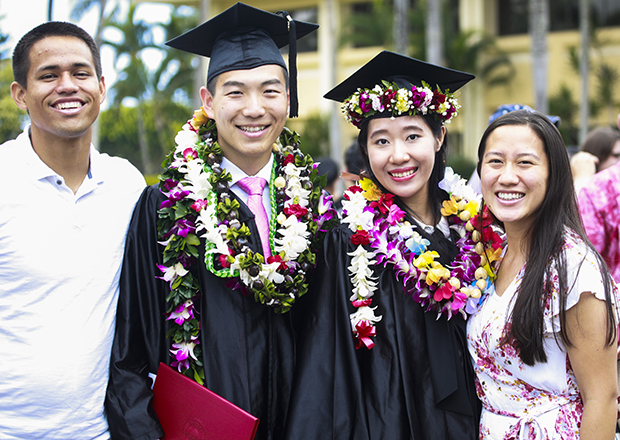
Graduates of BYU–Hawaii celebrate with supporters after commencement exercises on June 30. Photo by Monique Saenz, BYU–Hawaii.
Drawing from the novel The Chosen by Chaim Potok, President Tanner spoke of the importance of developing both a bright mind and, more important, cultivating a compassionate soul, “not a mind without a soul.”
Only those whose minds and souls have been properly educated can become “genuine gold,” President Tanner said.
Heavenly Father wants more than just a well-trained mind from His children. He expects the “soul of a Saint … not merely the mind of a scholar.”
“He wants your heart,” President Tanner said. “He wants a soul full of compassion, righteousness, mercy, strength to suffer with and carry the pain of others. That is what He wants of His children. Not a mind without a soul.”

Graduates of BYU–Hawaii celebrate with supporters after commencement exercises on June 30. Photo by Monique Saenz, BYU–Hawaii.
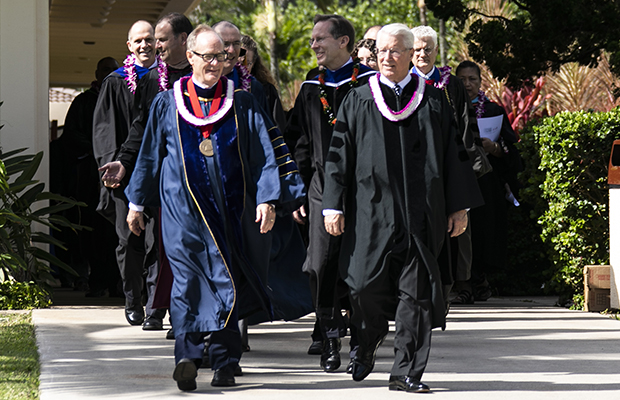
Bishop Dean M. Davies of the Presiding Bishopric, right, walks with BYU–Hawaii President John S. Tanner prior to graduation on June 30. Photo by Wesley Ng, BYU–Hawaii.
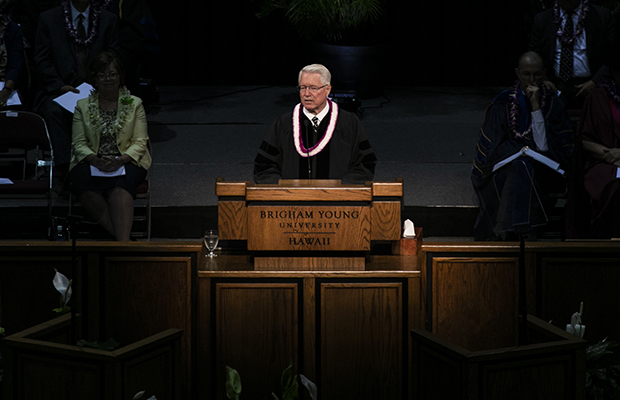
Bishop Dean M. Davies of the Presiding Bishopric speaks during BYU–Hawaii graduation on June 30. Photo by Wesley Ng, BYU–Hawaii.
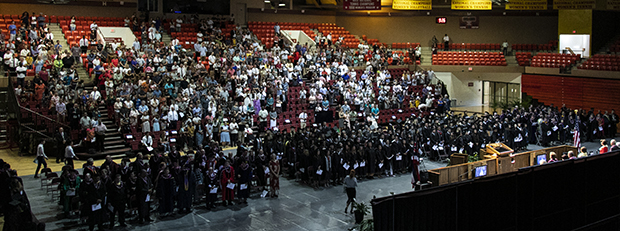
Graduates and their supporters meet in the Cannon Activities Center on the BYU–Hawaii campus for commencement on June 30. Photo by Wesley Ng, BYU–Hawaii.
